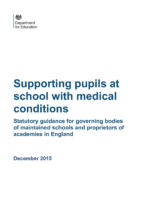We will support all students, on an individual basis, to have full access to all school activities, to make progress in their learning and in their overall development by recognising their medical needs, supporting them to access medical and therapeutic interventions and by modifying their provision as necessary.
Parents and carers have the prime responsibility for their child’s health and should provide the school with up to date information about their child’s medical needs. It is the parent/carer’s responsibility to provide in-date medication for their child.
There is no legal duty that requires the school or school staff to administer medicines but The Valley School policy is that, where appropriate and acceptable, medicines will be administered by designated staff.
All staff that manage and administer medicines will have the necessary training. They will receive ongoing training and support from health professionals. There will always be a trained first aider available during the school day.
We will support our students to be resilient and caring. For minor ailments, colds, headaches and routine discomfort (period pains), we will encourage our students to take appropriate action to feel more comfortable. This will include exercise and food and drink, the use of heat and cold pads and the administration of plasters etc. For ongoing or significant conditions or illnesses, we will encourage our students to understand their individual circumstances in order to access all opportunities. Unless recommended differently by medical advice, we will support them to take part at all times, but we will offer rest breaks, additional support or any other relevant action.
Key Statutory Regulations and Significant Links
Key Responsibilities
- Record keeping – medical needs will be recorded on Arbor. This must include any notified illnesses, medicines and updated information received from parents and carers or medical professionals. This includes short courses of medication.
- Sharing knowledge and information – all relevant staff must be made aware of medical conditions. There must be clarity about how staff must respond to ensure that students’ medical and learning needs are fully met.
- Planning for individual needs – any student with a long-term or serious condition that has a significant impact on their learning or who has ongoing needs that require understanding or intervention to ensure that the student is able to access their full education will have a medical support plan. This will identify what action needs to be taken and what support needs to be in place for the individual student. Students and their families must be involved in establishing and reviewing this plan. Decisions about who will need a medical support plan will be made by The Senior Learning Leader and Head of year in consultation.
- Self-care – all staff will support pupils to be more comfortable in their learning by ensuring that water is available at all times and by offering rest breaks, fresh air, or other interventions as necessary. If necessary, students will be able to have basic food (toast etc.) if that would help them to feel more able to learn.
Key Practices
- On admission, all parents and carers will complete a medical form or be part of a discussion with a member of the office staff to ensure that all relevant information is recorded. Parents/carers should also be encouraged and given straightforward processes to update this information on a regular basis and following significant changes. If circumstances (e.g. build-up of absences and/or medical appointments) indicate that there may be a change to or an additional medical need, The school office will make direct contact with the family, rather than waiting for the family to be in contact.
- Relevant information will be recorded on Arbor and highlighted for staff.
- Individual Health Care Plans (Medical Support Plans) will be in place whenever necessary.
- Students who are too unwell to remain in school will be sent home. They must be collected by a parent or carer unless there are exceptional circumstances when allowing a student to travel home independently is considered to be safe.
- Students will be sent or taken to the medical room via the school office if they need additional actions to support them. They should not be sent to the medical room if they are suffering from minor illnesses, (colds, coughs etc.) which cannot be improved by qualified first aid, unless they are too unwell to remain in school.
- If a student is injured, they should be assessed by any member of staff who is qualified in First Aid and action should be taken according to the circumstances.
- If an ambulance is called and/or a student must go to hospital, a member of staff must stay with the student until a parent or carer is able to attend.
Medicines
Trained staff may administer a controlled drug to the child for whom it has been prescribed. Staff administering medicines should do so in accordance with the prescriber’s instructions.
We will keep a record of all medicines administered to individual children, stating what, how and how much was administered, when and by whom. Parents and carers must always be informed.
Any side-effects of the medication will be noted and information sent home.
When no longer required, medicines should be returned to the parent/carer to arrange for safe disposal.
Sharps boxes will always be used for the disposal of needles and other sharps.
- Medicines will only be administered at school when it would be detrimental to a student’s health or school attendance not to do so.
- For all prescription medicines, the first dose must be administered at home to ensure that there is no allergic or negative reaction. No student should be given prescription or non-prescription medicines without written consent. In exceptional circumstances where written consent has not been given, verbal consent may be accepted, but must be recorded.
- Students must never be given medicine containing aspirin unless prescribed by a doctor.
- Medication must never be administered without first checking maximum dosages and when the previous dose was taken.
- Where clinically possible, medicines should be prescribed in dose frequencies which enable them to be taken outside school hours.
- We will only accept prescribed medicines that are in-date, labelled, provided in the original container as dispensed by a pharmacist and include instructions for administration, dosage and storage.
- All medicines should be stored safely. Children should know where their medicines are at all times and be able to access them immediately.
- Medicines and devices such as asthma inhalers, blood glucose testing meters and adrenaline pens should be always readily available to children and not locked away.
School Trips
Staff must have basic First Aid equipment on all school trips. Staff must check Arbor to ensure that individual medical needs are known and planned for. Medication must be prepared in advance, acknowledged on appropriate trip paperwork and carried at all times. It must be returned after the trip.
Accidents
Accidents, to staff and students, must be recorded in the accident book within twenty four hours.
Investigations
In the event of an accident or injury which may have been caused by the deliberate or accidental actions of a student or staff member, it is not the responsibility of the First Aider to investigate the incident or record it in the behaviour log. This must be investigated by the appropriate staff member, usually the tutor or Head of Year.




